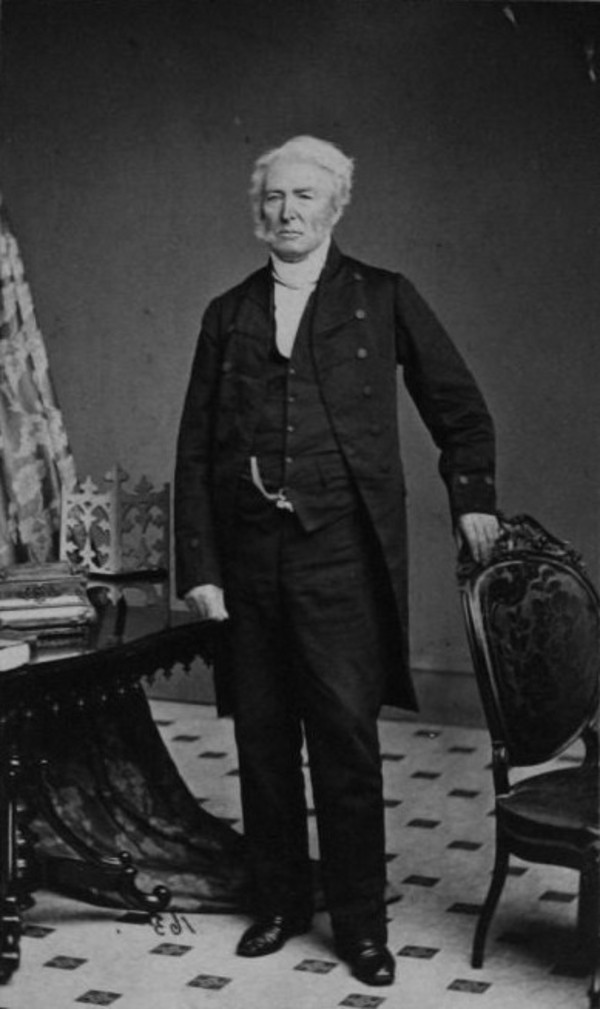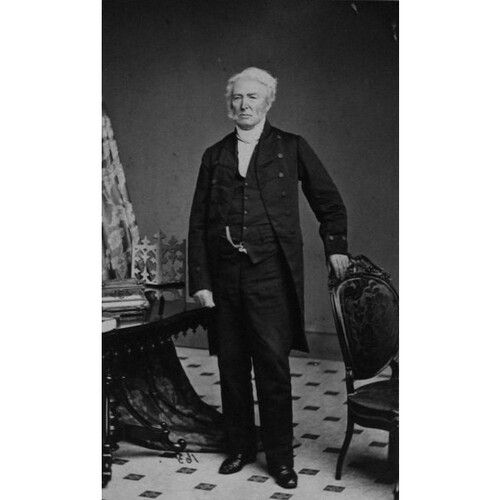
Source: Courtesy of Wikimedia Commons
McLEAN, ARCHIBALD, lawyer, politician, and judge; b. 5 April 1791 at St Andrews, Luneburg District, Province of Quebec, second son of Neil McLean and Isabella Macdonell; m. Joan McPherson, and they had seven children; d. 24 Oct. 1865 at Toronto, Canada West.
Archibald McLean’s father was prominent in the Eastern District, serving at various times as sheriff, militia colonel, and judge. Archibald attended John Strachan’s School in Cornwall and developed a lifelong friendship with its master. In 1809 McLean articled in law at York (Toronto) under William Firth*, then attorney general. The War of 1812 interrupted his legal studies and he became a subaltern in the 3rd Regiment of York militia. At the battle of Queenston Heights on 13 Oct. 1812, McLean was seriously wounded, but he crawled from the battlefield to a nearby village where his wounds were hurriedly dressed. His recuperation, prolonged because of an infection resulting from the late removal of a bullet, was not yet complete when the Americans attacked York on 27 April 1813. Still unfit for combat because of his illness, McLean buried the York militia’s colours in the woods and escaped to Kingston. He was back in action on 25 July 1814 at Lundy’s Lane, where he was captured by the Americans and held prisoner for the duration of the war.
In 1815, after declining a commission in the British regulars, McLean was called to the Upper Canadian bar and entered the firm of William Warren Baldwin*. The following year McLean established his own lucrative practice in Cornwall. The McLean family were members of the Church of Scotland, leaders in the Cornwall area, and related through marriage to prominent local Scottish Catholics. It was to be expected, therefore, that as a rising member of the Family Compact, McLean should be elected to the assembly for the county of Stormont in 1820. In the assembly he gradually became a leading Tory member and an advocate of recognizing the rights of the Presbyterian Church as equal to those of the Church of England. McLean held the Stormont seat until 1834 when Cornwall was incorporated as a town and received its own seat. That year he won election as member for Cornwall and he became speaker of the assembly in 1836. He again represented Stormont in the 13th parliament which opened 8 Nov. 1836.
Promoted colonel in the militia during the Rebellion of 1837, McLean was involved in routing the rebels in Toronto, commanding the left flank of the loyalist forces under Colonel James Fitzgibbon in the attack on Montgomery’s Tavern. McLean initially opposed the union of 1841 out of fear that Upper Canadians would be dominated by French Canadians. He saw responsible government as a danger to the British connection and to the ordered freedom and the recognition of class and property of the British tradition, but he quickly adjusted to the new reality.
Archibald McLean began his long judicial career with an appointment to the Court of King’s Bench for the western circuit in March 1837; he was replaced as member for Stormont by his brother Alexander in December of that year. In 1850 he was transferred to the newly created Court of Common Pleas where he served with James Buchanan Macaulay* and Robert Baldwin Sullivan*. In 1856, when he was passed over as this court’s chief justice in favour of William Henry Draper*, he returned to the Queen’s Bench as a senior judge. In December 1860 McLean dissented in the case of John Anderson, a fugitive slave, and argued that he should be discharged: “in administering the laws of a British province, I can never feel bound to recognize as law any enactment which can convert into chattels a very large number of the human race.” On 15 March 1862 he was appointed chief justice of the Court of Queen’s Bench for Upper Canada. McLean was a Conservative from a prominent old Tory family. Nevertheless, in July 1863 Reform Premier John Sandfield Macdonald*, who had articled with McLean and served under him on the western circuit, had him appointed to the less onerous post of presiding judge of the Court of Error and Appeal when Sir John Beverley Robinson died. McLean, now 72, was replaced as chief justice by Draper.
For many years McLean was president of the St Andrew’s Society of Toronto. When he died in 1865 he was honoured by an impressive public funeral. The Upper Canada Law Journal commented that McLean “upon the bench was dignified and courteous; unsuspicious and utterly devoid of anything mean or petty in his own character, his conduct to others was always what he expected from them.”
PAO, McLean (Archibald) papers, Misc. coll., 1807–57. Upper Canada Law Journal (Toronto), XI (1865), 281–84. Read, Lives of judges. L. J. Blom-Cooper, The language of the law (New York, 1965). Craig, Upper Canada. J. G. Harkness, Stormont, Dundas and Glengarry: a history, 1784–1945 (Oshawa, Ont., 1946). B. W. Hodgins, John Sandfield Macdonald, 1812–1872 (Toronto, 1971). A. M. Macdonell, Incidents in the life of the late Chief Justice Archibald McLean: seven years president of the St. Andrew’s Society, Toronto (n.p., n.d.).
Cite This Article
Bruce W. Hodgins, “McLEAN, ARCHIBALD (1791-1865),” in Dictionary of Canadian Biography, vol. 9, University of Toronto/Université Laval, 2003–, accessed December 29, 2024, https://www.biographi.ca/en/bio/mclean_archibald_1791_1865_9E.html.
The citation above shows the format for footnotes and endnotes according to the Chicago manual of style (16th edition). Information to be used in other citation formats:
| Permalink: | https://www.biographi.ca/en/bio/mclean_archibald_1791_1865_9E.html |
| Author of Article: | Bruce W. Hodgins |
| Title of Article: | McLEAN, ARCHIBALD (1791-1865) |
| Publication Name: | Dictionary of Canadian Biography, vol. 9 |
| Publisher: | University of Toronto/Université Laval |
| Year of publication: | 1976 |
| Year of revision: | 1976 |
| Access Date: | December 29, 2024 |



